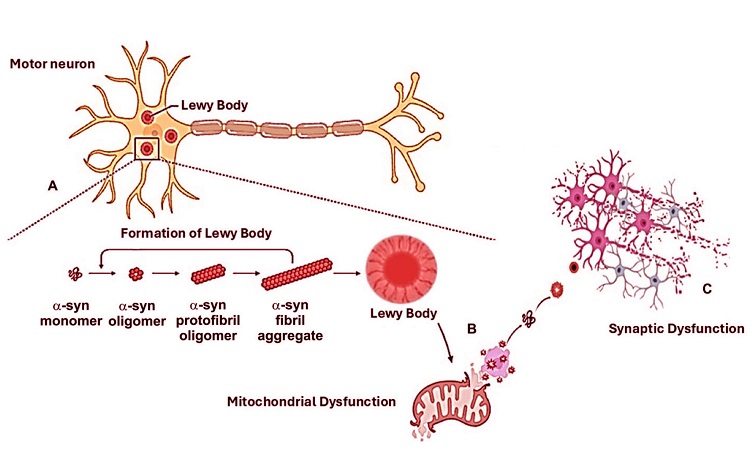Understanding How Mitochondrial Issues May Fuel Memory Loss in Parkinson’s Disease
Nikhil Prasad Fact checked by:Thailkand Medical News Team Oct 27, 2024 1 year, 1 month, 3 weeks, 3 days, 1 hour, 43 minutes ago
Medical News: The Surprising Connection Between Mitochondria and Memory in Parkinson's
Parkinson’s disease (PD) is commonly associated with motor symptoms, but one of its lesser-known yet highly impactful aspects is cognitive impairment. A recent study by researchers from Italy delves into how mitochondrial dysfunction in the brain may contribute to these cognitive challenges in people with Parkinson’s Disease. This discovery offers fresh insights into the biological mechanisms behind PD-related memory loss and opens the door to potential new treatment approaches focused on the brain’s cellular “powerhouses.”
 Relationship between α-syn aggregation and mitochondrial dysfunction as pathogenetic mechanism of neuroplasticity rearrangement. (A) The increased deposition of misfolded α-syn within the Lewy bodies (B) induces mitochondrial dysfunction in the soma and neurites of dopaminergic neurons, with (C) consequent alterations in synaptic communication and plasticity.
The Institutions Behind the Research
Relationship between α-syn aggregation and mitochondrial dysfunction as pathogenetic mechanism of neuroplasticity rearrangement. (A) The increased deposition of misfolded α-syn within the Lewy bodies (B) induces mitochondrial dysfunction in the soma and neurites of dopaminergic neurons, with (C) consequent alterations in synaptic communication and plasticity.
The Institutions Behind the Research
The study, spearheaded by researchers from Federico II University of Naples and IRCCS Synlab SDN S.p.A. in Naples, Italy, explores the intricate workings of mitochondria in the brain cells of people with PD. This
Medical News report aims to make this complex study accessible and break down its key findings for a broader audience.
Mitochondria’s Role in Brain Health
Mitochondria are tiny organelles within cells, best known for generating energy. They do this through a process called oxidative phosphorylation, which is especially crucial for brain cells. These powerhouses are also dynamic, traveling within brain cells to meet energy needs wherever they’re highest. In Parkinson’s disease, researchers believe that the mitochondria may become dysfunctional, which might impair energy production and lead to issues in brain areas responsible for memory, decision-making, and attention.
How Mitochondrial Dysfunction Impacts Memory and Cognition
The research highlights that mitochondrial dysfunction can disrupt various brain regions, each responsible for different cognitive tasks. For instance:
-Hippocampus and Prefrontal Cortex: Reduced energy production here may be linked to memory deficits often seen in Parkinson’s disease patients.
-Parietal and Occipital Lobes: Problems in these regions could affect visuospatial abilities, making it harder to navigate environments or remember spatial relationships.
-Frontal and Temporal Lobes: Issues in these areas may lead to slower thinking processes, language difficulties, and challenges with problem-solving.
Each of these brain regions requires substantial energy to maintain healthy functioning. When the mitochondria cannot meet this demand, cognitive abilities may be compromised.
rong>The Dual Role of Mitochondria and α-Synuclein
In Parkinson’s disease, a protein called α-synuclein forms clumps in the brain known as Lewy bodies. These clumps disrupt normal brain function, and researchers have found that α-synuclein may interact directly with mitochondria, further damaging their function. As α-synuclein builds up, it can interfere with mitochondrial processes, creating a cycle of dysfunction that worsens brain degeneration.
Key Findings: Mitochondrial Dysfunction’s Path to Memory Loss
The study found that mitochondrial dysfunction in Parkinson’s disease goes beyond simple energy loss. It also:
-Increases Oxidative Stress: Damaged mitochondria produce more free radicals, which can harm brain cells and lead to cognitive decline.
-Affects Synaptic Health: Healthy mitochondria are vital for the connections between neurons (synapses). Mitochondrial issues disrupt these connections, impacting communication between brain cells.
-Triggers Neuroinflammation: Mitochondrial dysfunction activates immune responses in the brain, further contributing to cognitive impairment and potentially worsening Parkinson’s disease symptoms.
Why These Findings Matter for Future Treatments
Understanding how mitochondria contribute to cognitive impairment in Parkinson’s disease has practical implications for treatment development. The researchers suggest that targeting mitochondrial health could become a new avenue for therapies aimed at slowing down or possibly even preventing memory loss and other cognitive issues in Parkinson’s disease.
Experimental Models and Research Methodology
The researchers used both animal models and cellular experiments to simulate PD and study mitochondrial function under these conditions. They examined how changes in mitochondrial activity affected cognitive domains like memory and attention. In animal models, they found that even before visible motor symptoms appeared, cognitive issues were already emerging, closely linked to early mitochondrial changes. This finding supports the idea that cognitive decline could be an early indicator of Parkinson’s disease, potentially leading to earlier diagnosis and intervention.
Looking Ahead: The Potential of Mitochondrial Therapies
Based on these insights, the researchers propose several promising strategies for treating cognitive impairment in Parkinson’s disease:
-Antioxidant Therapies: These treatments could help reduce the oxidative stress that contributes to mitochondrial damage.
-Gene Therapies: Targeting genes related to mitochondrial health may help correct issues in mitochondrial DNA that affect energy production.
-Mitochondrial Biogenesis Stimulants: Drugs that encourage new mitochondria to form could boost overall energy levels in brain cells, potentially improving cognitive function.
-Stem Cell Therapies and Mitochondrial Transplants: Although still experimental, these techniques may offer ways to directly replace damaged mitochondria or stimulate brain cells’ ability to repair mitochondrial function.
Conclusion: Hope for New Treatments Focused on Brain Energy
While cognitive impairment remains a significant challenge for people with PD, the discovery of mitochondrial dysfunction’s role brings hope. By focusing on improving mitochondrial health, future treatments may be able to offer more effective ways to manage PD-related cognitive symptoms. As researchers deepen their understanding of this connection, these strategies could evolve into therapies that improve quality of life and potentially slow the progression of memory loss in Parkinson’s disease.
The study findings were published in the peer-reviewed International Journal of Molecular Sciences.
https://www.mdpi.com/1422-0067/25/21/11490
For the latest on Parkinson’s disease, keep on logging to Thailand Medical News.
Read Also:
https://www.thailandmedical.news/news/parkin-a-protein-associated-with-parkinson-s-disease-found-to-be-elevated-in-individuals-infected-with-covid-19
https://www.thailandmedical.news/news/new-study-reveals-that-linalool-and-geraniol-show-promise-in-treating-parkinson-s-disease
